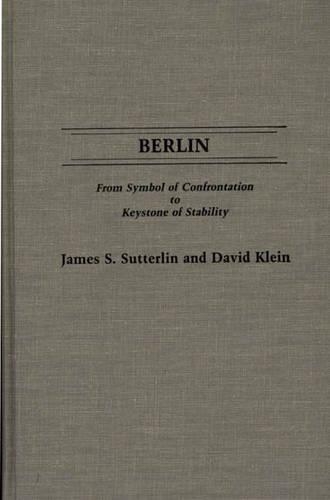
Berlin: From Symbol of Confrontation to Keystone of Stability
(Hardback)
Publishing Details
Berlin: From Symbol of Confrontation to Keystone of Stability
By (Author) David Klein
By (author) James S. Sutterlin
Bloomsbury Publishing PLC
Praeger Publishers Inc
3rd November 1989
United States
Classifications
Tertiary Education
Non Fiction
International relations
943.155087
Physical Properties
Hardback
243
Description
This book follows the relationship between the Western powers and the Soviet Union with regard to Berlin. The authors begin their study at that point when the State Department first considered the fate of Berlin during World War II and take the reader through to the 1971 Four Power Agreement that governs the present operation of the city ending with their assessment of its implications for the future. The book aims to provide an in-depth understanding of the 1971 agreement as well as the disputes and interests which defined the major powers' positions on Berlin and, to a large extent, determined the city's post-war fate. The authors examine in detail the negotiations that culminated in the Four Powers Agreement and include much heretofore unpublished information stemming from their personal roles in the negotiating process.
Reviews
A book subjected to the cruel whims of history. Obviously completed before current events overtook even the most fantastic scenarios, the authors deny all but the most remote possibility of German reunification. But, failed prophecy aside, the book traces the relationship between the Western powers and the Soviet Union with regard to Berlin, from World War II through the consequences of the 1971 Four Power Agreement governing the subsequent operation of the city.-Reference & Research Book News
"A book subjected to the cruel whims of history. Obviously completed before current events overtook even the most fantastic scenarios, the authors deny all but the most remote possibility of German reunification. But, failed prophecy aside, the book traces the relationship between the Western powers and the Soviet Union with regard to Berlin, from World War II through the consequences of the 1971 Four Power Agreement governing the subsequent operation of the city."-Reference & Research Book News
Author Bio
JAMES S. SUTTERLIN is with the Yale University Institution for Social and Policy Studies. He served as vice-consul in Berlin, 1946 to 1948, and was a personal witness to post-war Berlin and the Berlin Blockade. He was the Director of the Office of Central European Affairs in the Department of State, 1969 to 1972, and was responsible for most of the guidance and instructions sent to the American Representative in the quadripartite negotiations on a Berlin Agreement. DAVID KLEIN is special assistant to the president of Fairleigh Dickenson University. He served as a Senior Member on the National Security Council during the Kennedy years and was witness to Kennedy's handling of a Berlin crisis. He was the American Minister in Berlin during the 1969-1971 quadripartite negotiations. He was present at the negotiating sessions and was familiar with all the main actors including those on the Soviet side.
